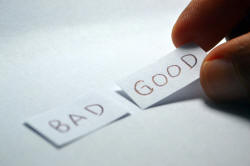Strand 1: Giving feedback on error

You arrived here because you agreed or fully agreed with this statement:
I’m not always sure whether I should correct an error, make a note for later or ignore it
As was noted on the previous page, this is a judgement call and nobody gets it right all the time. However, there are some ways to make our judgements more reliable and more consistent. You need to develop a conscious system for pausing when you hear error and considering the best way to deal with it. It's complex and depends on a number of variables.
 |
Understanding error |
First you need to revise or learn about some of the key concepts concerning errors learners make. Go to either the in-service guide to the technicalities of error analysis or an easier guide to error. (Both those links will open in a new tab so just close the page to come back to this point.)
As you know, we can view error as something to be avoided at all
costs and make sure our learners make as few of them as possible or
treat error as part of the learning process.
If you hold the first view, then you will have to correct all errors in
the language as they occur. You have no choice because the theory
is that errors will become habitual and permanent parts of the learner's
language if they are not eradicated or avoided. Even better, of
course, you will design lessons and tasks so that errors do not occur at
all.
However, if you have started
this development strand, it's more likely that you hold the second view
and want to investigate what to correct and how to correct it.
That's the assumption here.
 |
Whether and what to correct: targeting feedback |
The first step in developing your skills in handling error is to make
the process of deciding whether to correct as automatic as you can.
At first, this may slow down your responses to students but, as
experience grows, the time-lag shortens. What questions do you ask
of yourself to decide whether to correct?
Click here when you have reflected briefly.
- How systematic is the error?
- If it's pre-systematic (i.e., the learner has never encountered
the language before), then it's probably not worth taking too much
time correcting. If you simply need to supply a single word,
then it's OK to correct.
If it's systematic, then you probably need to do something because the learner needs your help in acquiring the language at this point.
If it's post-systematic, then it's probably just a slip you can safely ignore. Alternatively, just a gesture or grimace is usually enough to alert the learner and encourage self-correction. - Is the error in language or skill-use which is the target of my lesson?
- If the error has nothing to do with the targets of the lesson, you would be well advised to ignore it to maintain your focus.
- Will correcting the error interrupt too much?
- If you are at a stage in a lesson when your focus is on fluency, not accuracy, then a sensible way forward is just to note the error and wait for a more opportune time to draw the learners' attention to where they went wrong.
- How serious is the error in terms of communication?
- If the error is so serious that the learner cannot be understood, it's probably wise to step in and sort the problem out.
The situation is sometimes a bit muddy because an error may be pre-systematic (so you don't want to correct) but also interfering with communication (so you do). An error may be in the target language but also come at a time when you don't want to interrupt the flow of a fluency-focused stage. That's a judgement call.
Clearly, you will need to take a bit of time to process these questions before you decide whether to correct or not so here are two suggested self-training programmes:
 |
Programme 1: |
Decide before the lesson what you will correct. For example (select only one for each lesson you target):
- In this structure lesson I will only focus on the targets of my lesson and will ignore all other error, or
- I will ignore any error in the lesson which is not systematic, or
- I will not interrupt anyone in this skills lesson but will make a note of errors and set aside two phases in my lesson, one in the middle and one near the end, when I will focus on students' errors and get them to try to correct them before I teach.
 |
Programme 2 |
Negotiate what to correct with your learners and let them know what
you will correct.
You could, for example, establish a routine of having a 20-minute
opinion-sharing exercise at the end of each day on a different topic
but, on certain days, you will focus exclusively on pronunciation while
on others, lexical choice will be your focus and at other times only
grammatical and structural errors will be corrected.
You can do the same kind of thing with lots of different
types of activities.
(Some learners, it is true, think they want the teacher to correct all
and every error they make. Trying that for one lesson usually
persuades them that it is not actually what they want at all.)
 |
How to correct |
A lot of learners expect their teacher to do the correction work and,
yes, that is sometimes the appropriate way. It is, however, not
the only way. What questions should we be asking here?
Reflect for a moment about how you correct and then click here for some
ideas.
- Question 1: do I need to correct this?
- Very often, learners can correct their own production so a quizzical look or stopping learners and getting them to retrace their steps and reconsider may be more effective than your correcting the error.
- Question 2: can anyone else correct the error?
- If the learners can't correct their own errors, perhaps someone else in the class can. If you think this is the case, give them the chance to do so.
- Question 3: how will I correct?
- A last resort is normally to give
the correct answer yourself. Often, learners can be led to discover
the right answer with questions and suggestions such as
There's something wrong with the order of the words
What preposition do we need here?
What tense should this be?
Are we talking about tomorrow or today?
or
Is this a long 'a' sound or a short one?
and so on.
If all else fails, however, there are, obviously, times when providing the right answer is the best approach providing you make sure that the learner can produce the correct language independently after you have done so.
You can follow a similar procedure to train yourself to apply these criteria
automatically by focusing on one at a time.
Decide at the start of your day's teaching, for example:
- Today I will always try to elicit the
correction from the learners before I provide the answer
or - Today, my first response to an error will always be a quizzical look, followed by "Try again, please."
 |
Gauging progress |
There's a guide to gauging progress for any development process in
this section for some general ideas about how to gather data on your
classroom behaviour.
In the case of handling error, however, your own and your learners'
opinions are very important. Specifically, you could ask yourself
whether you feel more confident handling error after trying out some of
these suggestions. And you could explain to the learners what you
are trying to achieve and get their feedback on whether they feel your
error handling seems more helpful and more relevant.
Ways of getting feedback from learners are covered in the guide to
gauging progress.
